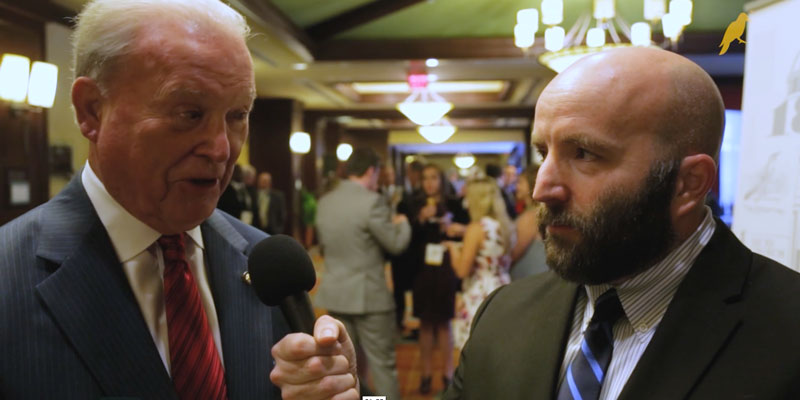Cord Sachs is a Birmingham-based leadership expert and the CEO of FireSeeds, a company that helps companies find and grow great leaders and “the company behind many of Alabama’s fastest growing companies.”
The full conversation with Mr. Sachs can be heard on the Yellowhammer Radio podcast or in the video above, and a lightly edited transcript of his interview with Yellowhammer’s Andrea Tice and Scott Chambers can be read below.
Subscribe to the Yellowhammer Radio Podcast on iTunes. Learn more about Cord Sachs and Fireseeds at www.fireseeds.com
Scott Chambers:
Welcome back again to Yellow Hammer Radio, Super Station 101, WYDE. I am Scott Chambers.
Andrea Tice:
I’m Andrea Tice. We are going to start our next section with FireSeeds. Cord Sachs is the founder of FireSeeds. He’s been at it since 2011 and he’s been leveraging 15 years of recruiting and leadership development experience. Cord launched FireSeeds to recruit dynamic leaders and install leader development strategies into world-changing businesses. I believe I hear him on the line.
Scott Chambers:
Absolutely. Cord, how are you today?
Cord Sachs:
Doing great. Scott, Andrea, good to hear from you.
Andrea Tice:
Good to have you here.
Scott Chambers:
Good to have you here, man. Sorry, I’m a little down today. I think I’m suffering from some midlife crisis or something going on. I don’t know what’s going on in my life today. I here today, Cord. I’m here.
Cord Sachs:
Well, very good. That’s what we’re going to talk about today is the midlife crisis.
Andrea Tice:
Perfect.
Scott Chambers:
Boy. What a day to talk about that.
Andrea Tice:
Have you been tapping his phone or his computer, wire tapping?
Cord Sachs:
I hear you guys have been pretty fired up in the last few segments.
Scott Chambers:
Yeah, we have been, Cord. We have been. Well, let’s talk a bit about the old midlife crisis there. Midlife crisis, it’s an interesting thing. You hear the term all the time but what exactly is a midlife crisis and what is it about, actually?
Andrea Tice:
Yeah, that’s a good question.
Cord Sachs:
All right. This midlife crisis is a crisis of regret. It’s basically based on a picture that we all build throughout our lives of what success should look like at some point in the future. When we don’t hit that picture, when we don’t our picture and definition of success at that time when we do hit it, we have a crisis. We have a crisis of why didn’t I hit it. Did I not have what it takes? What if I never hit this level of success? There’s the crisis.
Andrea Tice:
That is probably the best description. I honestly mean this, Cord. That’s probably the best description where you’re hitting at the root of it, where you said it’s based on regret. Does this come at any particular time? Does it have to play out a certain length of years before a person gets into an evaluative mode and says, “Oh my gosh. I’m not living up to where I should be?”
Cord Sachs:
That’s a great question. It’s different for everyone. A Ph.D. out of Appalachian State who did a study on midlife crisis said there are typically triggers that trigger your midlife crisis. Some of them are as simple as hitting that decade at the zero, the 30, the 40, the 50-year mark that can throw you and trigger the crisis. A lot of times, it’s triggered also by a parent’s death and that’s what gives you your gauge of where your midlife should be. It happened for me. My dad died at 63 and I specifically remember thinking, “Wow, I’m almost 30 years old. I’m almost at the midway point of my life.” My midlife crisis, in a sense of thinking about that, happened in my early 30’s.
Scott Chambers:
Wow.
Andrea Tice:
A major life moment like a death can also trigger it earlier than the traditional 40 or 50-year-old mark that we have in our minds?
Scott Chambers:
Well, or just give you your gauge of where yours will be. If your mom or dad dies at 80, you just naturally think, “Wow, if I make it to 40, I’m halfway done.”
Andrea Tice:
Yeah.
Scott Chambers:
I was only half joking, Cord, when I said I’m having a midlife crisis but now I’m sitting here doing the math and I’m thinking, “Oh my gosh. I might actually be halfway through my life if I live to be 70 years old.” Wow.
Cord Sachs:
That’s right.
Scott Chambers:
Now that means I’ve got to go out and buy a sports car today. I got it.
Cord Sachs:
That’s funny but that’s a lot of times what happens. We think I’ve got to go fill a void. There’s this lack of fulfillment that’s happening now in my life and I’ve got to go try to fill it with something. That is the running joke but a lot of people go and buy that sports car. My dad did. He tells the story of buying a red sports car and a month later selling it for $10,000 less than he bought it for because he couldn’t put a 2×4 in the back of it.
Scott Chambers:
Oh, my goodness. Well, what about the people, though, Cord, that already have successful lives? You have a successful business and a successful home life. You’re already successful. Do those people have midlife crises as well?
Cord Sachs:
Absolutely, and the studies actually say those that meet their picture of success or far succeed their picture of success, if that has been their goal and they’re living for that picture of success, there’s actually more of a chance that they’re going to fall into a deeper crisis at this midlife point in time in their lives. Here’s the reason why. It’s because if you or I have this picture of success and we don’t get there … Let’s say it’s at 40 years old and we think we’re supposed to be at this point in our career and have made this amount of money and we don’t get there, we have a reason that we can blame this lack of this fulfillment on.
If you have reached that point of success and you’ve made maybe even more money than you thought and you get to that point and you fill that same lack of fulfillment, then you have no clue as to why. You’ve done everything you thought you should have to be successful and yet there’s still a void in your life. Many of those types of folks actually go into a depression around that time of life because they have no answers as to why.
Scott Chambers:
Wow.
Andrea Tice:
The actual success actually can bring more questioning of root or purpose than just striving? Actually reaching the goal can cause more of an introverted evaluation than the process of striving towards it.
Cord Sachs:
Not hitting it. That’s right, absolutely.
Scott Chambers:
Those people that have been really successful, when they do hit a midlife crisis as well, they potentially have a lot more money so when people go out and make these crazy midlife crisis purchases like the sports car, the beach home, these people have the money to go do it. Then I can see them being really more depressed.
Cord Sachs:
Absolutely.
Scott Chambers:
More so than you or I.
Cord Sachs:
Absolutely. You hear about in the world all the time. They go buy more and they get the bigger house and they go on that crazy adventure trip. They get back and it still doesn’t fulfill the void.
Scott Chambers:
Well, how do we avoid it, Cord? How do we actually avoid that?
Cord Sachs:
Notice we’ve been talking about success, living for success, having a picture of success. We avoid the midlife crisis by replacing the word success with significance. If we can learn to live for significance over success, that’s how we avoid the midlife crisis. Bob Buford has a great book out called Halftime and he talks about the process of so many people get to the halfway point in their life. They live for success but then they have a choice they can make. I can transition and choose to live the second half of my life for significance. If I do that, I can then begin to fill that emptiness, that void, and start getting fulfillment out of what I’ve striving and living for.
Andrea Tice:
Would you say, Cord, that the difference between success and significance is that success has these external, maybe more shallow markers whereas significance is more shall I say faith-based or spiritually-based?
Cord Sachs:
I would say your faith definitely plays into that. I think it’s aligning with purpose. That’s what we’re going to talk about next week as well so I’ll give a little teaser for it. In order for us to live a life of significance, it’s going to be aligning our lives with what means something, with what counts, the true purpose that brings the fulfillment. We’ll talk about purpose really having to do with four things.
Purpose has to do, first of all, with people. It always involves people. Number one, people, and there’s the people that providentially have been put in your path, number two. If you think about people and the people that are providentially put in my path every day, that’s clue two. Clue three is people that have been put in our path and the people you spend the majority of your time with. That’s clue three. Finally, clue four is people, people in your path, people you spend the most time with and people that you have the most influence over.
Scott Chambers:
Interesting.
Cord Sachs:
If you take those four factors and you think of where those four factors play out, you’ll come back to seeing that they play out primarily in the boardroom or in the family room, the time you spend at work and the time you spend at home.
Scott Chambers:
Interesting. I’m going to have to check that book out that you mentioned by Bob Buford, Halftime. That sounds like a really good book to read.
Cord Sachs:
A phenomenal book, absolutely.
Scott Chambers:
I’ll have to check that out.
Andrea Tice:
Very interesting. I think this is very helpful for people listening to understand the terminology that you put out there and that we should be not success-driven as much as significance and understand the difference between the two.
Scott Chambers:
Yeah, because if you don’t have that significance in your life, you’re not
going to be effective at work; you’re not going to be effective at home.
Cord Sachs:
I don’t see you achieving effectiveness in either place.
Scott Chambers:
Right.
Cord Sachs:
You don’t have to give up one for the other. You can live your life for significance and still be very, very successful. Your definition of success is altered a little bit but it doesn’t mean that you can’t have the same things that maybe would have been in your picture prior to you deciding that you were going to live for significance. They’re not mutually exclusive of each other, but you can’t gain the significance by only having a track towards success.
Scott Chambers:
Right. Great points today, Cord. Man, I’m fired up now.
Andrea Tice:
Yeah, I love it.
Scott Chambers:
I absolutely love it. Okay, Cord, great stuff. If people want to get in touch with you and FireSeeds, tell everyone how they can do such.
Cord Sachs:
Fireseeds.com. Check us out. If you want to email me, you can email me at [email protected]. If you have any questions about what we do, who we are, we replace multiplying leaders. We love to help companies build leader development tracks within their organizations, to help build leaders. That’s what we’re passionate about so any way we can help, reach out. We’d love to play a roll.
Scott Chambers:
All right. Our friend, Cord Sachs, with FireSeeds. We’ll talk to you again next Tuesday, Cord.
Cord Sachs:
Thank you, guys. Thanks, Andrea.
Andrea Tice:
Thank you. That was very deep stuff, very, very good, getting to the heart of the issue.
Scott Chambers:
Absolutely.













